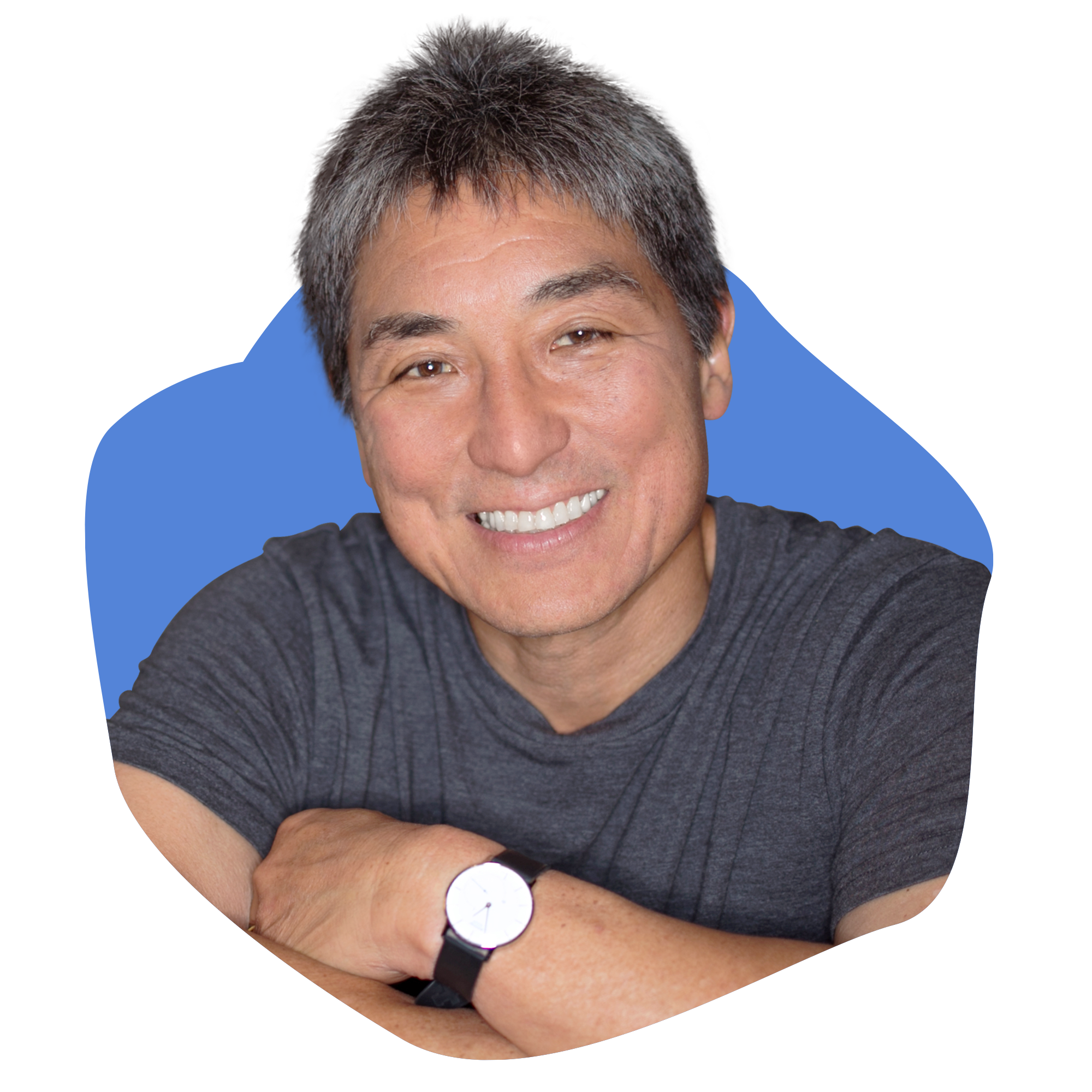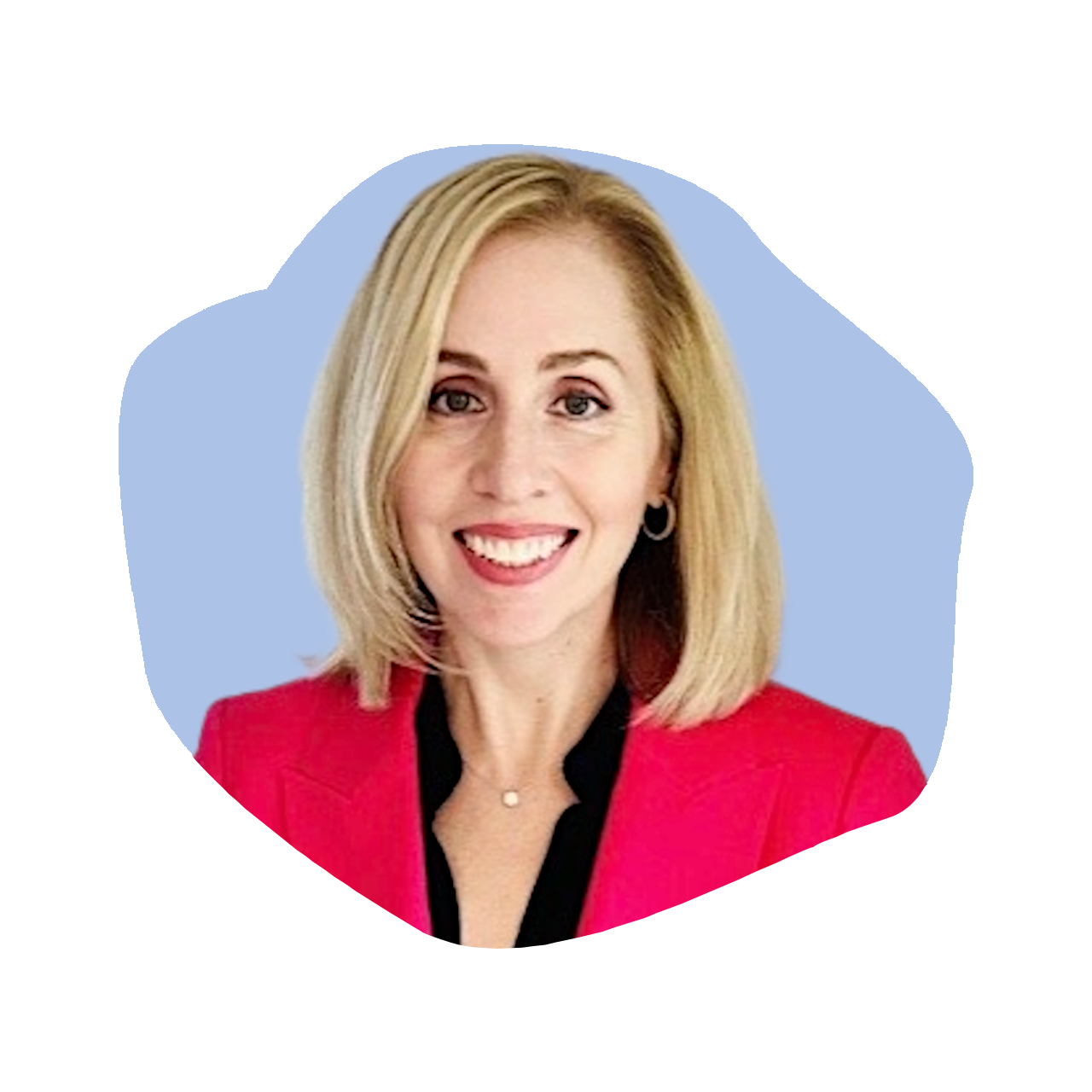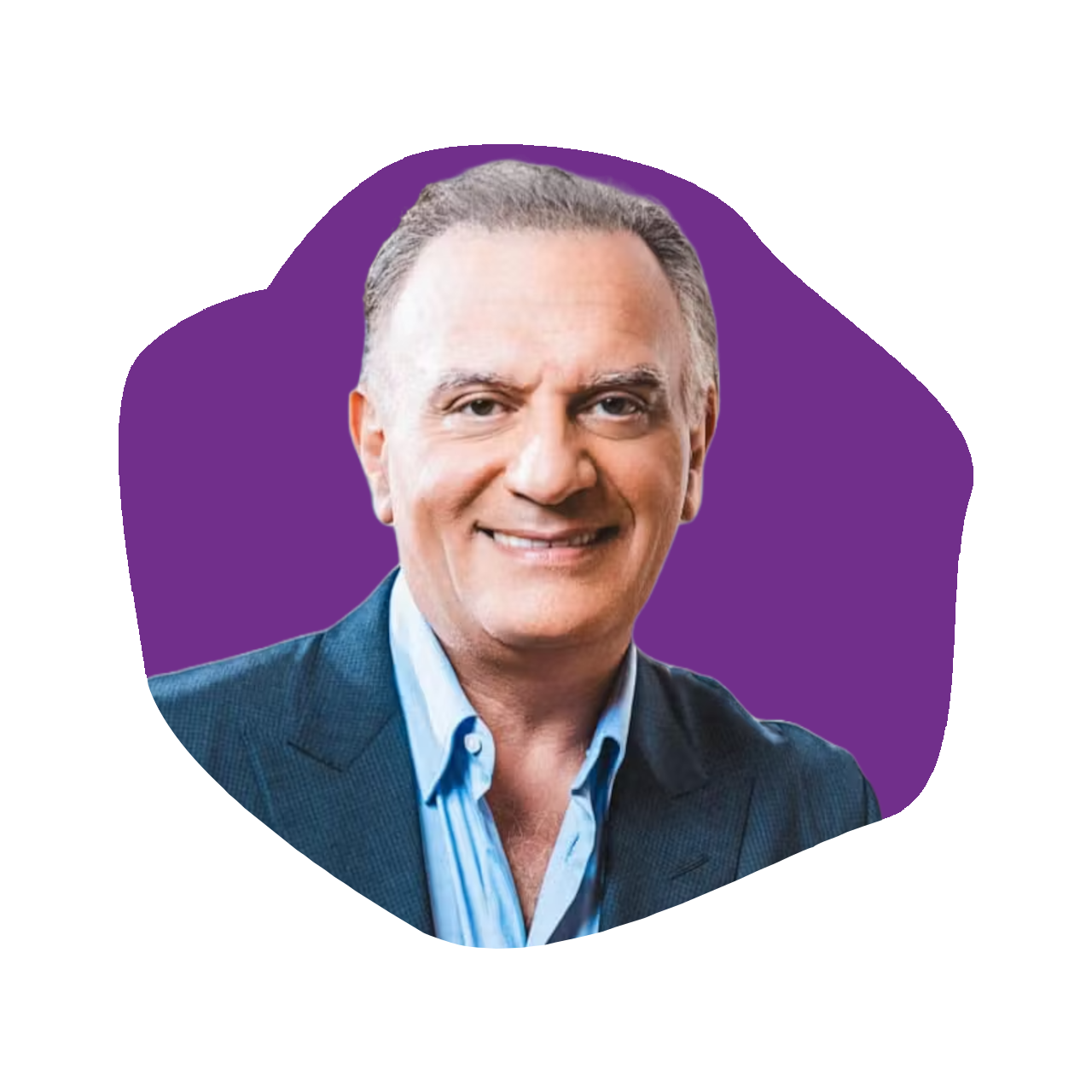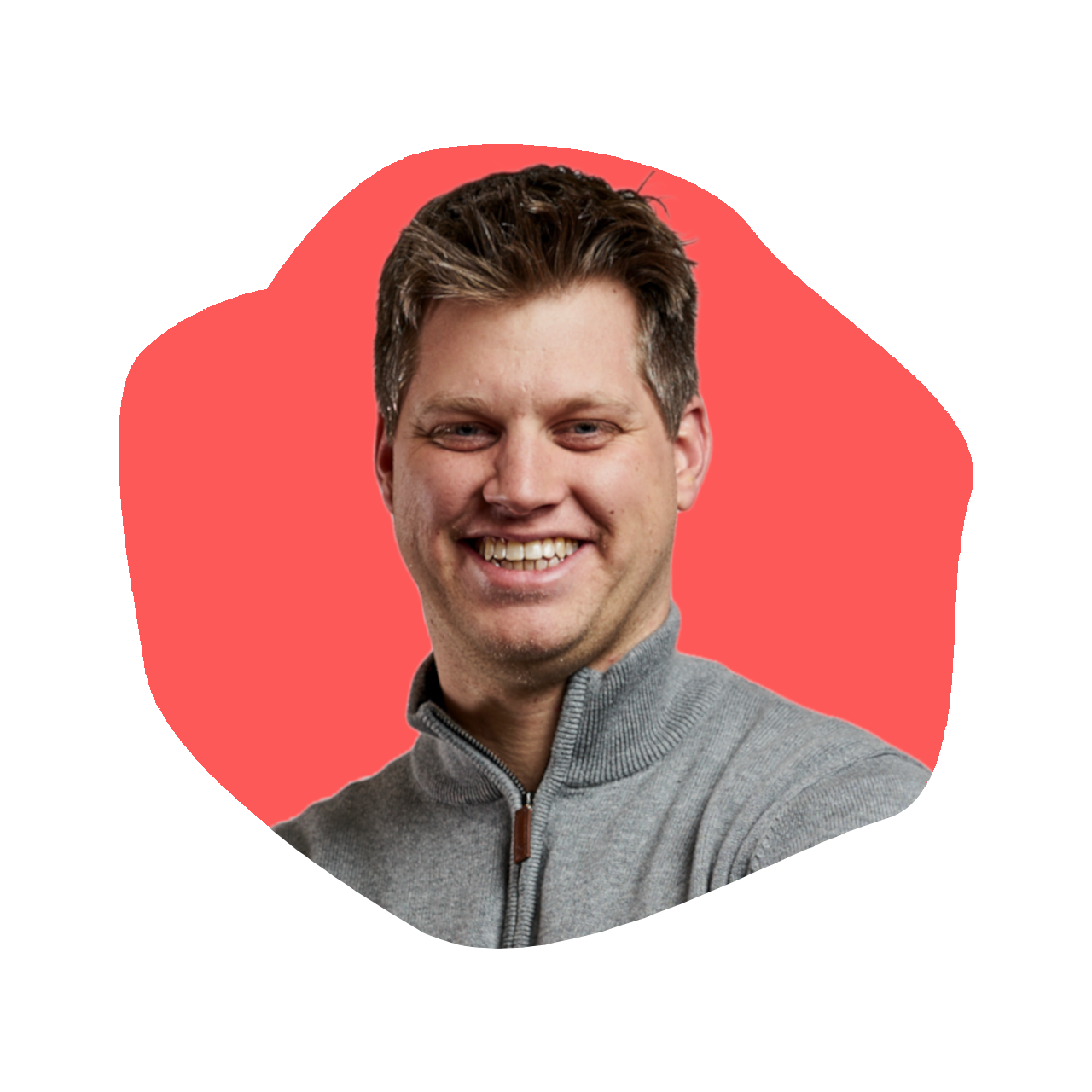Guy Kawasaki – Chief Evangelist of Canva and Entrepreneurship Expert
Episode 96

Resources from
this episode:
Transcript
Kara Goldin: Hi, everybody. It’s Kara Goldin, and I’m so excited to have our next guest here. And I mean Guy, I have been a huge fan of yours from way back when, even before I knew you and I’m super honored to have you here today. So Guy Kawasaki, for those of you who don’t know him, the renowned figure in tech and so many other things, but he was part of the Apple’s original Macintosh team. Lives in the Bay Area and widely respected expert in entrepreneurship, venture capital, marketing, business evangelism, and more. He’s shared many insights into dozens of books and he of course has his own podcast, Guykawasaki.com is his website. And he’s the chief evangelist of Canva. For those of you who are familiar with Canva and just lots … I mean, amazing, amazing stuff here. Guy is also a brand ambassador for Mercedes-Benz. I did not know that and an executive fellow of the Haas School of Business at Berkeley and an adjacent professor of the University of New South Wales.
And just overall, just an amazing, amazing, amazing guy on a lot of levels. And yeah, I mean I remember Garage.com way back when, and that’s when I really started following you and admiring just everything that you were building and super amazing. So take us back, welcome first and take us back a few years and to the beginning and tell us. Okay, so where’d you grow up guy?
Guy Kawasaki: Okay. So I grew up in Honolulu, Hawaii, and I left Hawaii to go to school in the Bay Area. And after that, I actually returned to Hawaii after I graduated from Stanford. Believe it or not, I went to law school the following year and I hated it.
Kara Goldin: A recovering lawyer.
Guy Kawasaki: No, no. I made a very quick decision. I hated law. So I left law school after two weeks and went back to Hawaii to work for the lieutenant governor’s office. Then I came back and I went to UCLA for an MBA, which is what I really was interested in business, not law. And then I worked part time for a jewelry manufacturer. This is a long story too, because I just needed some kind of part-time work to supplement my expenses.
Kara Goldin: Your life, yeah.
Guy Kawasaki: To supplement my life, yes. And then after I graduated from UCLA, I went to work for that jewelry manufacturing company. And then I got bitten by the computer bug when I first saw an Apple 2 from my classmate at Stanford. So I went into a software company for about six months. It was acquired by a company out of Georgia and I did not want to move to Georgia. So that’s when I joined the Macintosh division and I was Macintosh division second software evangelist. So my job was to convince software and hardware companies to make Mac products. And after that, I was there at Apple. I started a company, I was a writer, a speaker. I returned to Apple, started another company. And now I’m chief evangelist of Canva, which is an online graphics design service. And I am the creator of the Remarkable People Podcast. About two months ago, my Mercedes-Benz brand ambassadorship ended, so I’m a free agent right now vis-a-vis cars.
Kara Goldin: Everybody listen, listen up, if you got any connections there. He would be awesome. That’s so great. So take us back to, of course the Macintosh days. And how fun was that? I mean, when you look in the rear view mirror. What’s the tech museum down in San Jose, I love going there. Just looking around at things that you didn’t even know were going to be what they are today.
Guy Kawasaki: Who knew? Yes.
Kara Goldin: Yeah. I mean, you were a part of that, which is just amazing on so many levels.
Guy Kawasaki: It was truly an amazing time. I wish that everybody, once in their life works for a Macintosh division, works for a Steve Jobs or is a Steve Jobs even better. And it’s hard to describe definitely a reality distortion field and everything you heard about Steve Jobs and read about and seen in movies are all true. He was very difficult to work for, extremely demanding, actually scary. I literally was scared of how he could rip people, how he could embarrass you, et cetera, et cetera. Having said that, I would not trade that experience for any other business experience. I am where I am because of him. And it was a fantastic learning experience.
And one of the lessons that I learned in my life is as you look back over your life, the teachers and the bosses who are the hardest are probably the ones that helped you the most. And when you’re in the process, you’re looking for the easiest teacher and the easiest boss, but with hindsight, my toughest teacher was an English teacher in high school named Harold Keebles. And my toughest boss was Steve Jobs at Apple. And those people, those two people were highly, highly influential in my success.
Kara Goldin: Yeah. I mean, you obviously have read my book and were kind enough to give a blurb on it, but I think about that a lot. And I also talk about in writing my book, it was a bit of therapy too. And I 1000% agree with what you’re saying. I think sometimes people don’t really realize how they’re coming off as bosses. I mean, I really think that the most successful … I mean, my book is called Undaunted: Overcoming Doubts and Doubters. I think that the most successful … Clearly many entrepreneurs do have these doubts and doubt doubters and anxiety and they go around screaming and I think Steve in many videos towards the end talked about that. He recognized that he was that person, but on the other hand, I think everybody had an enormous amount of respect for him too.
Guy Kawasaki: Oh, yeah. I mean, I’m literally awe. I think that to address what you just mentioned, every entrepreneur who’s sane and intelligent, and with any degree of probability of success is scared. I mean, this concept that an entrepreneur, the swash buckling person, who’s totally confident knows he or she’s going to be successful has no doubts, has no fears, total bullshit.
Kara Goldin: Yeah.
Guy Kawasaki: What I just described is someone who’s probably a megalomaniac who will not succeed. And so being an entrepreneur I think is about managing those fears and despite those fears and doubts forging ahead. And if you meet someone who says, “I have no doubt in my success, blah, blah, blah.” They’re either bullshitting you or they’re bullshitting themselves, but it’s not true.
Kara Goldin: No, it’s not true. No, I totally agree. It’s funny. I didn’t share this with you yet, but I got my first, it wasn’t a horrible review, but it wasn’t the best review of my book. I got a lot of people say, it was awesome. I put my big girl panties on before I started getting reviews because I knew it was going to come, but it was fascinating because the review was basically that the book did not give a one, two, three, how as an entrepreneur, you can be successful. And I said, “I can’t think … ” Right. I can’t think of one successful entrepreneur that would actually, and obviously you’re a successful one. That can actually say, here chapter by chapter. Here is one, two, three. And I said, “I would even go as far as to say that if somebody thinks they are an entrepreneur or want to be an entrepreneur, and then they like want that. And they expect the one, two threes.” They’re probably not really an entrepreneur.
It’s the stories of sort of … Nobody really realizes what they’re creating, or truly, if you want to do something different as well, you’re not going to have a rule book or a roadmap. You think you want something to kind of go off of, but would you agree?
Guy Kawasaki: Yes. I think that books like yours, which I found very, very interesting and useful. So much so that I violated your copyright and sent it to a friend of mine who’s the CEO of Merge4 and this is the ultimate sock company.
Kara Goldin: Yeah.
Guy Kawasaki: I interview for my podcast, 52 people a year, and yours is the first book that I took the PDF, I printed it and I sent it to somebody else.
Kara Goldin: You have my permission, you’re good.
Guy Kawasaki: Okay. I owe you four dollars.
Kara Goldin: Yeah, you’re good.
Guy Kawasaki: So yeah, there are books like yours and I wrote a book called The Art of the Start 2.0. That can increase the probability, maybe shorten the cycle, maybe prevent you from making the usual mistakes. But if there were such a thing as a tried and true guaranteed path to entrepreneurial success, there would be more entrepreneurial successes.
Kara Goldin: Yeah.
Guy Kawasaki: It’s not that simple.
Kara Goldin: Yeah. No, I totally agree. So when did you know that you were an entrepreneur? Like, I mean obviously you went [crosstalk 00:10:21].
Guy Kawasaki: It’s not clear I know yet.
Kara Goldin: Yeah.
Guy Kawasaki: I think entrepreneurship, it’s a mindset and I suppose Elon Musk and Steve Jobs probably has different DNA than you and I, or at least me, but I think it’s often it’s thrust upon you. You can look back and retroactively interpret things to prove that you were a born entrepreneur. You had a paper route at 8 and at 10, you started selling earrings online and at 14, you started doing this. So you can look back and say, “Yeah, I knew I would be an entrepreneur.” But I’m telling you, there’s a lot of people who are selling earrings and making jewelry and selling tie-dyed shirts and who had paper routes who are not entrepreneurs anymore. So it’s not a science. And if anybody tells you a science, they’re deluding themselves.
Kara Goldin: Yeah. No, I agree. I had an old friend from grade school who wrote me on Facebook the other day. And she reminded me, she said, I always knew that you were going to be an entrepreneur because you started a day camp with me. And we started this when I was 12 years old. I wanted to make some money in the middle of 120 degree heat in Arizona in the summer. And I said, “Robin, let’s start a day camp.” And she said, “Where are we going to do it?” And I said, “We can do it at my house. I got a big yard. And here’s what we’re going to do. We’re going to go get a bunch of boxes at the grocery store that are for toilet paper and paper towels. And we’re going to build a city.” She said, “A city, that’s going to take a long time.” And I said, “Okay, we’re going to build a town. Let’s start with the town. And maybe I’ll go to a city.” And she said, “Where are we going to get the people?” And I said, “We’re going to make a sign and we’re going to go on the corner.” And she said, “How much are we going to charge?” And I said, “I don’t know. We won’t put the price on there. And then we’ll ask the parents will say like a five dollars. And if they go for it, then we’ll do it.”
Guy Kawasaki: It was too cheap.
Kara Goldin: And so two weeks later we were sold out, two weeks later we split the money at age 12. And she was like … And I said “Do you remember why we closed?” And she said, “You just got bored. Like after a while you were like, I don’t want to do this anymore. Let’s go build something else.” And I said, “Yeah, that’s pretty much it. That’s what I do today. I do hand sanitizers and all kinds of other things that are start tinkering in once these businesses are going.” So talk to me about Canva.
Guy Kawasaki: Yes. So Canva is an online graphics design service. I am chief evangelists for the company. I’ve been there about six years. Basically we have democratized design. So it’s now the case that using Canva, basically anybody can make beautiful designs that help them become better communicators. So the way it works is we have these design types, a type would be an Instagram post, a Facebook post, a flyer, or a business card, a resume, a presentation. And within those design types, we have hundreds of templates that are already beautifully done for you. So you pick a design type, let’s say you want to make a flyer. So we go to the flyer type. You pick one of the templates, you change the text because it’s unlikely that our text exactly matches your PTA meeting flyer. And then you change the picture or you use our … We have millions of stock images that you can use. And I would say that it would take you between five and 10 minutes to create a beautiful flyer.
And we make about seven million images a day. Yeah, seven million a day. And we have about 36 million active users, monthly active users right now. So it is definitely kicking butt.
Kara Goldin: That’s amazing. I feel like, in addition to you being an educator, an author and speaker, I was describing you to somebody the other day. And mentioning that I think there are a handful of people that I can look at who truly want to hold people on their shoulders and lift them up. And I think I always see you really showing up and speaking at some of these conferences where, it’s not necessarily the Ted’s of the world. It’s the entrepreneurs that really want to be inspired. Why do you do that? What makes you Guy? I just think it’s awesome. And it’s sort of-
Guy Kawasaki: Well, I mean, to be transparent, some of those events that you see me at, I’m being paid a lot of money to do it. Okay.
Kara Goldin: That’s okay.
Guy Kawasaki: Don’t make me into Mother Theresa.
Kara Goldin: But you’re still educating. Yeah, but you’re still educating, which I love.
Guy Kawasaki: Okay. There’s sort of three qualities to an invitation. So it’s an organization that I like, a product that I like, or a lot of money, any two will do. And I feel at the end of my life I want people to remember me as someone who empowered people, in the words of Steve Jobs, “To dent the universe.”
Kara Goldin: I love it. No, that’s amazing, amazing. So you’re a father as well. And what advice do you … You have one? One daughter or more?
Guy Kawasaki: I have one daughter and three sons.
Kara Goldin: And three sons. So what advice do you give your kids for life? Knowing that you’ve done so much and worked with such great people.
Guy Kawasaki: Listen, they don’t give a crap who I am.
Kara Goldin: For the moment, for the moment. They will.
Guy Kawasaki: I don’t know about that. I don’t think they ever will. You may experience this shortly, one of my books became a New York Times bestseller or something like that, which is kind of the Holy Grail for any author. Right?
Kara Goldin: Totally.
Guy Kawasaki: New York Times bestseller. One day I became that and I went to them and they’re like, “Okay, but dad, what are we eating for lunch?”
Kara Goldin: Yeah.
Guy Kawasaki: It didn’t even last half a minute. So I don’t hold myself up as a role model as a parent because there’s too much pressure for that. But I try to teach my kids that the key to life I think is grit, that it’s not being naturally smart or naturally talented or naturally anything, or being gifted or something like that. It’s grit. And if you had two people, one who is, or at least thinks he or she is naturally talented and another who is just gritty and just willing to grind it out. I would always pick the gritty person. And that’s the secret to my success. It’s my grit. It’s nothing else.
Kara Goldin: Yeah. And I don’t think you lose that grit either, especially if you’re an entrepreneur with grit. I interviewed the CEO, just yesterday. We just released his podcast of Radio Flyer.
Guy Kawasaki: Yeah. The wagon?
Kara Goldin: Yeah, the wagon, you got to listen to it Guy, it’s great. So he’s the grandson, his grandfather produced the product and super fascinating story. And I asked him, how life was through COVID and he explained how his huge time for selling wagons is the holiday season. And so they’re doing all kinds of production right now. They’re based out of Chicago, they do everything locally. And so I said, “Well, how’s that going? Like, did your factory shut down?” And he said that they dismantled their factory and basically went around to their employees and put their factory, like components of their factory on people’s lawns. And so they allowed people to continue doing like the parts. So they didn’t screw up for the holiday season coming up. But I said like, “Wait a minute, like this a 100 year old company.” The ability to do that kind of stuff, that’s grit, right?
Guy Kawasaki: That’s grit.
Kara Goldin: Right. For him to just think about it. And he said, “I said to everybody, listen, you can stay home. You’re doing the handle. And you’re going to build that. And welding, and then that’s all you do. And then we’ll come by and we’ll pick them up.” Anyway, I was like, “That’s awesome on so many [crosstalk 00:20:14].”
Guy Kawasaki: That’s a great story. I mean compared to our government should save our ass. I need a PPP five million dollar loan so that I can get through this, right?
Kara Goldin: No, totally. I totally agree. But I love hearing those stories where, companies doing well, established, all these things. You can still get gritty and roll up your sleeves and really figure out stuff. It’s awesome. So let’s talk about confidence. I guess that kind of goes hand in hand with grit maybe, but have you had doubts and doubters along the way that have said, “I don’t know that guy, Guy, I’m not sure he can really do it.”
Guy Kawasaki: Well, I think there’s two kinds. So one is the external one. And so my thoughts on the external one is that just because someone doubts you, that doesn’t mean you’ll fail. To a large degree, you’re responsible for whether you fail or succeed. The opposite is also true though. Just because someone doubts you doesn’t mean you will succeed because they’re wrong. So it all comes back to grit. And grit, I think also creates luck. So there’s the external doubters.
Now there’s also maybe more pernicious is the internal doubters, which is, can I really do this? Am I good enough? Am I smart enough? Am I whatever enough? And that may be the more dangerous one. And the only solution that I know to that is fake it till you make it, because that’s what we’re all doing at some level, don’t kid yourself. Most people are faking it until they make it.
Kara Goldin: Yeah. No, I think you’re absolutely right. Or so often I tell people that, it’s not about whether or not you can do it, but it’s about figuring out whether or not you can get out of your own way. Because you build these walls up around yourself. And I think oftentimes when you’re an entrepreneur and you’re a founder too, and clearly this is what Steve Jobs talked about. I mean, it’s a bit lonely. You absolutely have your own doubts but it’s really trying to figure out how do you get past those?
Guy Kawasaki: I would bet that even Steve Jobs had doubts.
Kara Goldin: Yeah. A 100%.
Guy Kawasaki: And Elon Musk. Right?
Kara Goldin: Yeah.
Guy Kawasaki: But some of it is, as I say, faking it till you make it. And also I would make the case that some doubt is good because if you’re scared and doubting, if it doesn’t paralyze you, then it makes you try harder, which is good. I mean if you think you’ve been handed life on a silver platter, so therefore you don’t have to work hard, that will probably be a self-fulfilling prophecy of doom there. So it’s better to be scared.
Kara Goldin: Yeah. No, I think it’s absolutely right. Another person who read my book who shared some wisdom with me a few years ago was Jamie Dimon from JPMorgan Chase. And he definitely says exactly what you say. It’s okay for you and your kids to be a little bit scared and get gritty and be confident or fake it till you make it, just until … That you don’t have some parachute to come and take you away. There’s nothing wrong with just a little bit of fear in there.
Guy Kawasaki: I would highly recommend listeners by a book called … It’s called Mindset, I believe.
Kara Goldin: Yep, it’s a great book.
Guy Kawasaki: It’s the Stanford Professor Carol Dweck, D-W-E-C-K. And she basically says, there are two kinds of mindsets. There’s the growth mindset, than the non-growth mindset. And the growth mindset means that you can acquire new skills. You can improve, blah, blah, blah. Life is not handed to you on a silver platter. The non-growth mindset means that you think you’re doomed and you’re stuck or that you’re blessed and you don’t have to do anything. And the growth mindset is the one that I believe ultimately wins.
Kara Goldin: Yeah. One of my favorite books, such a good book. I totally, totally, totally agree. So last question. What makes you unstoppable? Of course, we’ve heard a little bit already, but I’d love to hear Guy’s words of wisdom.
Guy Kawasaki: So apparently you ask everybody this question at the end, right?
Kara Goldin: Yep.
Guy Kawasaki: Well, I don’t know how other people have answered, but I don’t consider myself unstoppable. but I can work harder than most people in the world. And so I might not be unstoppable, but I’ve got grit. And I also think that, thinking about whether you are unstoppable or not is a waste of time and what you should be thinking about is not, am I unstoppable or stoppable? What you should be thinking about is how do I make my product? How do I make my service? How do I lead better? How do I do all these things? And if you do all these things, guess what? You may be unstoppable. But I don’t think Steve Jobs ever sat around and said, “Now, how am I unstoppable?” He didn’t give a shit about that. He just wanted to make the best computer, the best phone, the best tablet, the best music device, the best store. And so-
Kara Goldin: But I think a lot of people thought he was unstoppable. He may not of saw it, right?
Guy Kawasaki: Yes.
Kara Goldin: But it’s an interesting thing because I think people may … I like at you and I think you’re unstoppable, but yet you, this is calling on your doubts over here and the reality of what goes on. Right?
Guy Kawasaki: I don’t think truly unstoppable people are sitting around thinking if they’re unstoppable, they’re just doers. And I’ll give you a sort of a related concept because people ask me about this a lot. How do you build a personal brand? I’m 25, 30. And I want to build a personal brand like you Guy. And I want to be influential and well-known and blah, blah, blah, should I write a book? Should I give speeches? And all that? I said, “You know what? Stop worrying about building a personal brand, just build a great product, a great service, a great company.” And your personal brand is a natural outcome of that. You don’t sit around thinking, how do I position myself as a thought leader, only losers do that.
You build a great computer. You build a company that takes on Pepsi and Coke in the beverage business. You don’t sit around worrying about your fricking personal brand. And if you build a Hint or if you build a Macintosh or you build an iPhone, or you build a Tesla, guess what your personal brand will be fine but it’s not because you thought of yourself as a guru and a thought leader. And you wrote white papers that all of a sudden the world is now saluting you as a thought leader. So there.
Kara Goldin: I think you’re a 100% right on that. So I couldn’t agree with you more. So where do people find a Guy Kawasaki? What’s your social? You’re on everything, you’re everywhere.
Guy Kawasaki: Well, this is one of those things, it’s a tricky question. So if you want to follow me on social media to see what I’m doing, it’s probably Instagram, but there I’m just being me. I’m not trying to position myself as a thought leader or unstoppable or anything. Like I love surfing, so there’s a lot of surfing pictures. So if, want to see what I consider important in the world, follow my LinkedIn profile, but I will … I don’t know when this is coming out, but as a caveat, I will tell you that I am extremely liberal. And I believe in rights for-
Kara Goldin: You’re warning. There’s a warning-
Guy Kawasaki: Yeah, I’m giving you a warning.
Kara Goldin: Good, good.
Guy Kawasaki: I am extremely liberal. I believe in immigration. I believe in vaccination, except if the FDA approves something because someone else higher above it tells them to approve it. It’s just the great irony. Anti-vaxxers and liberals are now both going to be anti-vax, but that’s a different discussion. We don’t want to go down that path. So as I said, liberal, vaccination, women’s rights, the rights of people who are not old white and male. So if, I have just described the antithesis of what you want to learn about, do not follow me on social media.
Kara Goldin: That’s awesome. Well, many moons ago when I worked for John McCain in Arizona.
Guy Kawasaki: Yeah. You worked for John?
Kara Goldin: Yeah, you didn’t know this. And then I worked in the Obama administration too, but he gave me some very, very wise pieces of wisdom, which he said, “Sometimes you can actually agree to disagree with people and you can still appreciate and be friends and read their information.” And so till the day he died, I thought about that and really that’s the way he lived, as well. I mean, we all know who his friend … Biden was one of his best friends. I mean it was really, really interesting. So anyway, very, very wise guy, definitely go follow him and definitely check out his podcast. And I’m on his podcast.
Guy Kawasaki: Where you will be, shortly.
Kara Goldin: Yes. Yes, yes, yes. Very, very exciting. Okay, great. Thanks everybody. And definitely, if you like what you hear, definitely like this podcast episode and follow us and all that good stuff. Okay. Thanks so much. Have a great week.









